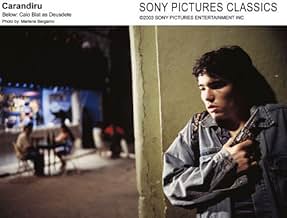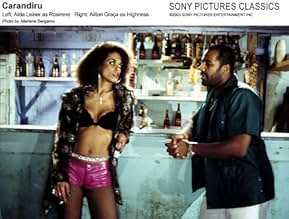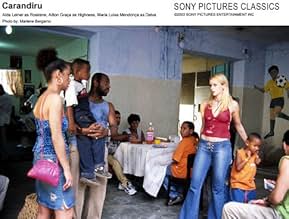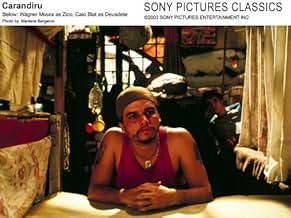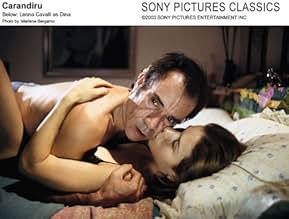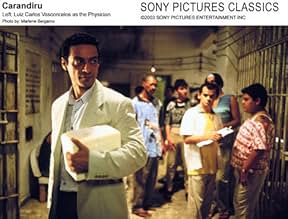Stories of crime, revenge, love, and friendship at the Carandiru Penitentiary, the largest prison in Latin America.Stories of crime, revenge, love, and friendship at the Carandiru Penitentiary, the largest prison in Latin America.Stories of crime, revenge, love, and friendship at the Carandiru Penitentiary, the largest prison in Latin America.
- Awards
- 16 wins & 33 nominations total
Enrique Diaz
- Gilson
- (as Enrique Díaz)
Aida Leiner
- Rosirene
- (as Aída Leiner)
Vannessa Gerbelli
- Célia
- (as Vanessa Gerbelli)
Featured reviews
As a Brazilian, I saw on TV many of the things that happened inside Carandiru, the biggest jail in Brazil and maybe the biggest in Latin America. I can clearly remember the news where we saw the police invasion and the slaughter they made there instead of stopping the prisoners rebellion
I knew this fact would be shown in Hector Babenco's film, but I could never imagine it would be so strongly illustrated. It's pure violence and the audience gets really astonished. Although it's really sad and we can't avoid being sorry for those deaths and suffering, it's impossible not to like the movie. It's excellent.
It's important to say that the invasion is not the only fact that is shown. Actually the book is based in Drauzio Varela's book. Mr. Varela is a doctor who worked in the jail helping the prisoners. The book, that is called "Estação Carandiru" (Carandiru station - because of the underground station that is nearby) is a success in Brazil.
27-year-old Rodrigo Santoro is one of the best actors we have in Brazil nowadays. His talent on Brazilian TV Series have guaranteed him good roles in films made in the country and recently he has started an international career, once he'll be in "Charlie's Angels 2". Some other good actors like Milton Gonçalves and Caio Blat add more positive points to the production. Some others, unknown up to now, showed they'll probably have much success in the future due to their talent, like Lázaro Ramos.
Argentinean Hector Babenco directed 'Carandiru' with a great sense of art, talent and made his film probably the best one of Brazilian cinema this year.
My rate 10/10
I knew this fact would be shown in Hector Babenco's film, but I could never imagine it would be so strongly illustrated. It's pure violence and the audience gets really astonished. Although it's really sad and we can't avoid being sorry for those deaths and suffering, it's impossible not to like the movie. It's excellent.
It's important to say that the invasion is not the only fact that is shown. Actually the book is based in Drauzio Varela's book. Mr. Varela is a doctor who worked in the jail helping the prisoners. The book, that is called "Estação Carandiru" (Carandiru station - because of the underground station that is nearby) is a success in Brazil.
27-year-old Rodrigo Santoro is one of the best actors we have in Brazil nowadays. His talent on Brazilian TV Series have guaranteed him good roles in films made in the country and recently he has started an international career, once he'll be in "Charlie's Angels 2". Some other good actors like Milton Gonçalves and Caio Blat add more positive points to the production. Some others, unknown up to now, showed they'll probably have much success in the future due to their talent, like Lázaro Ramos.
Argentinean Hector Babenco directed 'Carandiru' with a great sense of art, talent and made his film probably the best one of Brazilian cinema this year.
My rate 10/10
Let's get things straight here, if you were drawn to this film due its comparisons to the equally magnificent City of God, you're going to be surprised. Aside from the fact that its a Brazilian film about criminals, there are few similarities. While City of God was an epic story of life in the slums of Rio De Janeiro, Carandiru is about much older criminals and the days leading up to the infamous Carandiru prison massacre.
However, this is not the non-stop assault on the senses of grim violence you might expect. In fact, only the last twenty minutes or so of the film deal with the massacre at all and the film instead concentrates on a much more human aspect to the carnage. Focusing on the character of the Doctor as he tries to raise awareness of AIDs in the prison, it revolves around his day to day life as he chats casually with the inmates, learning of their hopes, fears and more often than not, their reason for being in the prison in the first place. These are stories that range from sad, to touching to outright hilarity and you soon find yourself absorbed in this world of offbeat criminals, so much so that when the violence does erupt, it is all the more shocking for it.
There are differences to the normal, US prison drama as well. I'm not sure how the Brazilians run their penitentiaries, but here there are no uniforms and they are allowed many of the comforts of home, along with free reign of the prison yard. But these are still drab conditions, with multiple inmates crammed into a single room, sweltering in the intense heat of the tropical summer. And ultimately, the prison is a community, made of genuine individuals, rather than clear cut prison stereotypes. This is a masterful film, one of my top movies of all time.
However, this is not the non-stop assault on the senses of grim violence you might expect. In fact, only the last twenty minutes or so of the film deal with the massacre at all and the film instead concentrates on a much more human aspect to the carnage. Focusing on the character of the Doctor as he tries to raise awareness of AIDs in the prison, it revolves around his day to day life as he chats casually with the inmates, learning of their hopes, fears and more often than not, their reason for being in the prison in the first place. These are stories that range from sad, to touching to outright hilarity and you soon find yourself absorbed in this world of offbeat criminals, so much so that when the violence does erupt, it is all the more shocking for it.
There are differences to the normal, US prison drama as well. I'm not sure how the Brazilians run their penitentiaries, but here there are no uniforms and they are allowed many of the comforts of home, along with free reign of the prison yard. But these are still drab conditions, with multiple inmates crammed into a single room, sweltering in the intense heat of the tropical summer. And ultimately, the prison is a community, made of genuine individuals, rather than clear cut prison stereotypes. This is a masterful film, one of my top movies of all time.
I saw Carandiru after seeing Takeshi Kitanos "Zatoichi" at the Toronto Film
Festival. Let me tell you, my day was full of carnage but it's OK because both movies were very good. The director was there as well as an actor or two if I remember correctly, they spoke about the film with true passion which added to the essence of the final product. It opend my eyes to an event that I never knew of. Highness was a great charater, Graca was my favorite, he should learn
english and get into the indie scene in North America. Good film 7\10.
Festival. Let me tell you, my day was full of carnage but it's OK because both movies were very good. The director was there as well as an actor or two if I remember correctly, they spoke about the film with true passion which added to the essence of the final product. It opend my eyes to an event that I never knew of. Highness was a great charater, Graca was my favorite, he should learn
english and get into the indie scene in North America. Good film 7\10.
One could easily get the wrong impression of the storyline here. Yes, it is based on the true-life massacre at the Brazilian prison in 1992 BUT that story is only shown in the last 30 minutes of this 145-miniute film.
The movie is really about the people who inhabited that prison back in that time. There are short profiles of numerous criminals, told through the eyes mainly of a doctor who is sent there. AIDs was a major problem in the jail. The doctor treats a lot of people who then tell him stories how they got to be inmates at Carandiru. In addition, there are bunch of scenes in which the inmates interact among themselves, shown as everything from antagonists to lovers.
Make no mistake: some of the stories are sordid, but its not as unpleasant to watch as one might think because the characters and the film-making are very interesting. The storyline moves fast, which is important considering the length of this film.
A viewer could even stop the movie at several points, pick up later without losing much since the story unfolds in segments. The ending (the massacre) really comes on suddenly. Unlike most movies,the story doesn't build up to the climax, here it just appears out of nowhere.
The same director who did the more-famous "City of God" filmed this and many critics here say it's not in the same league, but I thought it was at least in the same ballpark Both are entertaining, and most of us watch films to be entertained. So, if you liked ""City Of God," give this one a look as well.
The movie is really about the people who inhabited that prison back in that time. There are short profiles of numerous criminals, told through the eyes mainly of a doctor who is sent there. AIDs was a major problem in the jail. The doctor treats a lot of people who then tell him stories how they got to be inmates at Carandiru. In addition, there are bunch of scenes in which the inmates interact among themselves, shown as everything from antagonists to lovers.
Make no mistake: some of the stories are sordid, but its not as unpleasant to watch as one might think because the characters and the film-making are very interesting. The storyline moves fast, which is important considering the length of this film.
A viewer could even stop the movie at several points, pick up later without losing much since the story unfolds in segments. The ending (the massacre) really comes on suddenly. Unlike most movies,the story doesn't build up to the climax, here it just appears out of nowhere.
The same director who did the more-famous "City of God" filmed this and many critics here say it's not in the same league, but I thought it was at least in the same ballpark Both are entertaining, and most of us watch films to be entertained. So, if you liked ""City Of God," give this one a look as well.
'Carandiru' is a film based on the real experiences of Dr Drauzio Varella. He worked in Carandiru prison in Sao Paulo, Brazil, in the late 80s/early 90s carrying out Aids prevention work. During his work he came to know a lot of the inmates closely, and as he was a doctor got to see prison life in a way the other prison workers didn't. He made friends with a lot of the inmates, and learned a lot of their personal stories. The prison is extremely cramped, and the situation came to a climax in 1992. One entire block of the prison fell under prisoner control and a riot squad was sent in, killing 111 men.
The film is being dubbed by some as "this year's City of God", but it's very different to last years Brazillian smash. Where 'City of God' had some very flashy direction and MTV-ized zip-bang editing, 'Carandiru' is pretty straight forward. The film still has some great direction though, Hector Babenco has a leisurely style (matched by his actual output, it's been 7 years since his last film, and nearly 20 since 'Ironweed'), allowing the story the space it needs to breathe but still picking up the pace to build tension. Ironically the only section of the film I didn't really like was the bit that was the most 'City of God'-like. When the doctor is dealing with his patients he asks each one what their story is, and sometimes it's a bit forced, just like in 'City of God' with the "now it's my turn to tell you my story".
Where it's very similar to 'City of God' is it's themes - it's essentially a humanist comedy with a moral edge, dealing with love, hate, revenge, innocence and betrayal. The cons are poor and murderous, but lovable at the same time. If this film and 'City of God' are to believed drug-dealing thieving murderers all have their hearts in the right place and are all okay guys who just took a wrong turn on the road.
There's a bit of a stink being kicked up at the moment on the imdb forum for 'Carandiru'. A lot of Brazillian's are posting, very upset with filmmakers consistently showing Brazil in a negative light. I think that although both films do have that slant to them, they have actually increased interested in the country, and even more so the countries film output, taking it to a global audience. If all Scottish films are to be believed we're all a bunch of Glasweigan Gangster Hardnuts or heroin-addicted thieving murderers too, so I fail to see what the fuss is about.
The director drives home the real point of the film in the last 20 minutes. The overcrowding and in-fighting finally erupts into a full-blown riot that results in the main characters block being taken over by the prisoners. A riot squad enters, and the ensuing rampage is one of the most graphic and genuinely shocking ever committed to film. Definitely not for the faint-of-heart. I remember seeing the prison riot being reported in the UK news, and being appalled at how crowded the prison was, and how a government could let it reach boiling point like that. The last 20 minutes really smacked that home, but with the closing shots of the prison finally being demolished in 2002 you feel like there was at least some sort of closure on the tragedy.
The story is harrowing, but heart-warming, and the acting (mostly from unknowns) is top rate. It's my favorite film of the year so far, but do beware the last 20 minutes, you won't leave the cinema feeling happy.
The film is being dubbed by some as "this year's City of God", but it's very different to last years Brazillian smash. Where 'City of God' had some very flashy direction and MTV-ized zip-bang editing, 'Carandiru' is pretty straight forward. The film still has some great direction though, Hector Babenco has a leisurely style (matched by his actual output, it's been 7 years since his last film, and nearly 20 since 'Ironweed'), allowing the story the space it needs to breathe but still picking up the pace to build tension. Ironically the only section of the film I didn't really like was the bit that was the most 'City of God'-like. When the doctor is dealing with his patients he asks each one what their story is, and sometimes it's a bit forced, just like in 'City of God' with the "now it's my turn to tell you my story".
Where it's very similar to 'City of God' is it's themes - it's essentially a humanist comedy with a moral edge, dealing with love, hate, revenge, innocence and betrayal. The cons are poor and murderous, but lovable at the same time. If this film and 'City of God' are to believed drug-dealing thieving murderers all have their hearts in the right place and are all okay guys who just took a wrong turn on the road.
There's a bit of a stink being kicked up at the moment on the imdb forum for 'Carandiru'. A lot of Brazillian's are posting, very upset with filmmakers consistently showing Brazil in a negative light. I think that although both films do have that slant to them, they have actually increased interested in the country, and even more so the countries film output, taking it to a global audience. If all Scottish films are to be believed we're all a bunch of Glasweigan Gangster Hardnuts or heroin-addicted thieving murderers too, so I fail to see what the fuss is about.
The director drives home the real point of the film in the last 20 minutes. The overcrowding and in-fighting finally erupts into a full-blown riot that results in the main characters block being taken over by the prisoners. A riot squad enters, and the ensuing rampage is one of the most graphic and genuinely shocking ever committed to film. Definitely not for the faint-of-heart. I remember seeing the prison riot being reported in the UK news, and being appalled at how crowded the prison was, and how a government could let it reach boiling point like that. The last 20 minutes really smacked that home, but with the closing shots of the prison finally being demolished in 2002 you feel like there was at least some sort of closure on the tragedy.
The story is harrowing, but heart-warming, and the acting (mostly from unknowns) is top rate. It's my favorite film of the year so far, but do beware the last 20 minutes, you won't leave the cinema feeling happy.
Did you know
- TriviaDr. Dráuzio Varella wrote the original book at the encouragement of a patient he was treating for lymphatic cancer. That very patient happened to be Hector Babenco, who recovered and went on to direct the film adaptation.
- GoofsDuring the riot, as the inmates are running up the stairs of the cell block shortly after the riot squad has entered, one inmate can be seen wearing a T-Shirt of hip-hop group the Wu-Tang Clan. The group only formed in the year the riot took place (1992), and did not release their first widely available album (36 Chambers - Enter the Wu-Tang) until the following year. It is unlikely they would at this time have had a following in Brazil, nor would merchandise be available.
- Quotes
Lady Di: I've come to take the test.
Médico - Physician: Please, take a seat. First, I'd like to ask you a few questions, Lady Di.
Lady Di: I've seen this movie before, doctor. I've never needed a blood transfusion and I never pierce my veins. The only drug I use is a joint now and then... when I watch TV or for a little romance.
Médico - Physician: And partners, how many?
Lady Di: Oh, about 2000.
- ConnectionsFeatured in 2005 Glitter Awards (2005)
- How long is Carandiru?Powered by Alexa
Details
- Release date
- Countries of origin
- Official site
- Language
- Also known as
- Vzbura vo väznici Carandiru
- Filming locations
- Production companies
- See more company credits at IMDbPro
Box office
- Budget
- R$12,000,000 (estimated)
- Gross US & Canada
- $216,335
- Opening weekend US & Canada
- $17,945
- May 16, 2004
- Gross worldwide
- $10,781,635
- Runtime
- 2h 25m(145 min)
- Color
- Sound mix
- Aspect ratio
- 1.85 : 1
Contribute to this page
Suggest an edit or add missing content







